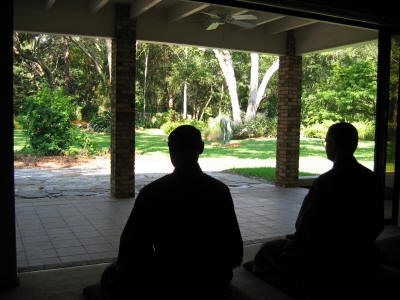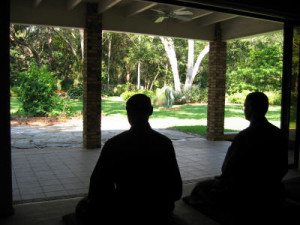People who have never given the teachings of the Buddha a second thought know all about subject and object. They know that cars, trees, bodies of water, the sun and all of that other stuff, including other people, is out there and the subject is the me who lives inside and perceives all that stuff.
Jerry Seinfeld in one of his episodes looks at an ottoman positioned in front of a recliner and says something like: “Such a mundane object. And they built an entire empire around that thing.”
And to think that the entire empire of Buddhist thought rests upon such a simple thing as the subject/object perception is just as amazing. Of course the Ottoman empire was not based upon the footrest, but the Buddhist empire does rest upon the very fundamental teaching of the Buddha on the subject of how the subjective mind perceives the objective world as being outside of it.
The Buddha taught, rather shockingly, that everyone who sees himself or herself as an independent subject that perceives an objective world is unenlightened, suffering from delusion. And the delusion is the belief in the subject/object dichotomy, i.e., the belief that an independent being is somehow unconnected to the external world but is able to perceive it.
In other words, the delusion is that the external world is independent of ourselves. We are deluded if we think it existed before we entered into it on the date of our birth and it will continue to exist after we exit it. We are not deluded if we understand (and not just believe) what the Buddha said in The Diamond Sutra, i.e., that no independent being has ever entered into existence and no independent being has ever exited.
Ask anyone to describe themselves and they will begin with their age, their birthplace, their nationality, their education, their family, their work, and so on. Ask them to go deeper and most people are simply speechless, insisting that they have fully identified themselves.
What they don’t notice is that they have described themselves in the same way they would describe the objective world, i.e., the world they perceive as being outside themselves. The self itself is just another object, another thing out there along with the rest of the universe.
Could it be true that the self is just another object, just another part of the objective world? And if that is true, what exists subjectively?
Here’s a way to find out. After we have tried, exhaustively, to identify ourselves, describing not just our statistics such as place of birth and so on, but also our bodies, our feelings or emotional states, and the mind objects that we pay attention to (professional sports, books, math, music, etc.), we say to ourselves: OK, so far every description of my innermost self is just another description of just another mind object. I can’t seem to describe what my ultimate subjectivity, my true self, really is. Therefore, I will give up because every description I generate is just another object of thought. I will now just let the self itself describe itself and I will get out of the way.
And we say: “Self, speak up! I am listening!” And then we listen. We maintain “vigilant expectation,” waiting for the self to speak.
For most of us, this is the first time we realize that there is no one there. Vast silence is how the true self speaks to us. It simply isn’t there. When challenged to show itself, it does show itself…as complete emptiness, as no objective thought.
Try it and you’ll see.
We don’t have the self we think we have. The self we have is indescribable, ineffable. It is unborn and therefore undying. It is not a part of the objective world of comings and goings, of entrances and exits. The never ending parade we see of war and peace, birth and funerals, has nothing to do with our true self. We can see the parade, hear it, touch it, smell it and taste it, but it is just the objective world and nothing of substance inside us is perceiving it. The part of us that seems to perceive it is just the objectified self, the self created by its own descriptions.
Our objective self gets all tangled up in the things it perceives and we develop the feeling that we are perceiving an external world when in fact it is just our external self, a mere external object, that is perceiving other external objects. That’s why the entire show, Shakespeare’s tale told by an idiot, full of sound and fury, signifying nothing, is exactly what Shakespeare called it.
And this tale told by an idiot is what we believe to be reality. “I saw it happen with my own two eyes. I know these things are real and it is absurd to contend that they are not, that they are mere mind objects, created by an unenlightened mind that is itself just one of the many mind objects it creates. Hitler was real, the holocaust was real. People were burned alive in atomic bombs, JFK was killed because Dallas right-wing talk show hosts urged their listeners to hate him. People walked on the moon. These things are real and they really happened.” This we believe. But our true self is not involved in the idiot’s tale. It is our unenlightened mind that perceives the external world.
And the external world that our unenlightened mind perceives is just a tale told by an idiot. The self we think we have is just another part of the same story. It even develops strong opinions concerning the tale.
The true self pays no attention to tales told by idiots.
What if the self is just another object? What if the self that was supposed to be a subject is really just another object? That would imply that there is no subject at all that we can identify because the act of identification is just an object-creating act.
So if there is a subject inside us, we can never know it. Whatever we “know” is an object and thus our knowledge is false.
So we practice every day and one day mind and body fall away. The objective world, including the suffering of the unenlightened mind that was a part of it, is gone. We then realize that the tale was unreal from the very beginning. That’s why people who wake up explode with laughter. Only the ineffable subject remains. Our objective self has done the work it had to do. We harness the deluded self to end its delusion. And we discover that the awakened mind is without limit, without beginning, and without end.
And the awakened mind does not go to an eternal retirement home in the sky. It has no self and it abides nowhere.
See Mindfulness, Bliss and Beyond by the Venerable Ajahn Brahm, Intuitive Awareness by the Venerable Ajahn Sumedho, and The Spectrum of Consciousness by Ken Wilbur for a more thorough and better-presented explanation of the Buddhist doctrine of no self.

